SEO, or search engine optimization, has been a lucrative industry for a decade. Yet, SEO skills are not taught at universities. Young professionals often have no clue what is needed to kickstart a career in SEO and gain relevant experience.
The majority start in marketing and later transition to SEO. This is how I became an SEO specialist.
If you want to learn more about the peculiarities of working in SEO and the skills required for SEO professionals to build a search engine optimization career, this article is for you!
As an SEO expert, I share my learnings, experience, and opinions on the following topics:
- What does an SEO specialist do?
- What type of skills do you need to be an SEO pro?
- Where and how to learn SEO skills
- How to showcase your SEO skills in your resume
- How to prove your SEO skills in a job interview
- What jobs can you do with SEO skills
It’s a pretty long article because I tried to make it insightful, practical, and applicable. I hope you will find it helpful.
Please do not hesitate to leave your comments if something is unclear or you would like me to share more details on a particular topic.
Before we dive deep into learning SEO skills and how to be great on top, let me quickly crush the myth many entry-level marketers still believe in — “SEO is hard.”
How hard is SEO?
As an SEO expert and a content writer, let me share my opinion on this matter.
SEO does seem complicated until you step in and start doing it yourself!
I was clueless about SEO when I got my entry-level SEO job long ago. I had no SEO abilities and did not know how to learn it. In time, I realized the best way to learn SEO and gain valuable SEO skills is to start doing it!
I started learning SEO as an intern, I continued creating SEO-friendly content for a UX agency, and now I have my well-optimized website with high rankings in search results.
SEO is not for everyone. However, if you are patient, diligent, and on a mission to create impactful results, you have a high chance of succeeding!
Google offers an incredibly insightful guide for learning beginner and advanced SEO I recommend you to look at it.
Don’t waste lots of money on SEO courses that repeat the same information. Instead, learn from the primary source — learn from Google.
What does an SEO specialist do?
I’ve been working in the online marketing field for over 5 years. Despite being called “a digital marketing specialist,” I’ve always dealt with SEO in its different kinds.
If you decide to pursue a career in SEO, your high-level goals might be the following:
1. Help businesses attract the target audience from organic search results.
As an SEO expert, you’ll have to use your SEO analyst skills and SEO writing skills to conduct keyword research and create optimized content.
If you do your job well, Google will notice your content and boost its search visibility. The more optimized content you create, the more traffic you can potentially attract to your client’s website.
SEO is not rocket science. However, you’ll have to possess particular experience and SEO marketing skills to help businesses stand out in organic search.
Optimization has been a great tool for marketing, especially for digital marketing agencies, to scale their businesses.
2. Help conduct an SEO audit
SEO experts are not always involved at an early stage of website growth. Many website owners believe they can manage their websites on their own. However, they often waste their time and resources without seeing any impact.
If you do not know why your website does not grow and how to improve its performance, you need an SEO audit.
SEO experts utilize various SEO tools to discover poorly performing pages, 404 pages, broken links, and desktop and mobile usability issues.
After conducting an in-depth SEO audit, they recommend actions to improve your website’s performance.
Based on my experience, an SEO audit is the first thing SEO experts do when jumping on a new project.
3. Help improve website performance
Besides creating optimized content, SEO experts deal with websites’ technical aspects, such as loading speed, indexability, appearance in search, mobile user experience, etc.
Some people don’t understand why it falls under SEO specialists’ responsibility since technical SEO skills are required. I can clarify this point for you.
Imagine, you open a website, but you have to wait for all pages and content to load. As a user, you don’t want to wait. And you should not!
There are millions of other websites which can satisfy your needs.
So, you close that website and navigate to another one that is fast, looks good, and answers your questions. You seem to be happy, and so does Google!
Google has a robust algorithm called RankBrain that analyzes user behavior, and rewards websites with good usability and fast loading speed. On the other hand, it downgrades unoptimized websites with poor mobile user experience.
The ultimate goal of any SEO professional is to push websites to the top. However, it’s no longer possible without technical optimization. Therefore, optimization experts need to have technical and HTML SEO skills.
4. Help acquire valuable backlinks from trustworthy websites
The number and quality of backlinks are among the ranking factors, according to Google.
Creating optimized content combined with gradual backlink profile growth will inevitably lead to success in the long term. It’s easier to say than do. However, SEO has never been a low-hanging fruit.
It takes time to collect website ideas, reach out to website owners, negotiate backlinks placement, and see the impact of link building.
Based on my experience, you need at least six months to see the first impact from your SEO work. However, it might be longer in some competitive niches.
What are SEO skills?
Tim Soulo, Ahrefs marketing CMO, defines the SEO job and skills in the following way:
“As an SEO expert, the goal is to provide the best information for Google to identify that you have the best information and show it to users.”
My SEO skills definition is the following: A set of soft and hard skills required for a marketer to achieve impactful results in SEO.
Whatever SEO skills definition you prefer, the ultimate meaning will be the same — you need to develop multiple SEO skills to grow as an expert and help businesses drive their organic growth.
In 2020, Semrush, a popular marketing tool, analyzed around 4000 SEO vacancies and job offers on Monster, Indeed, and Linkedin to define the following most desirable SEO skills.
Note that the percentage shows the number of mentions of a particular skill in SEO job offers.
- Google tools — 47%
- HTML, CSS — 45%
- Keyword research — 36%
- Link building — 34%
- Technical SEO — 31%
- Java script — 18%
- On-page SEO — 15%
- Mobile SEO — 11%
- Local SEO — 10%
- A/B testing — 8%
Even though Semrush research was conducted several years ago, it is still a solid study to rely on when developing new skills for SEO.
As an SEO expert, I created my list of skills for SEO specialists you will need this year and beyond to kick off an SEO career.
What skills do you need for SEO
My top 10 digital marketing SEO skills list is based on over 5 years of professional experience. The following are the SEO skills companies look for.
- Research and analysis
- Being a fast-learner
- Writing
- Being patient and flexible
- UX basics
- HTML and CSS basics
- Ability to use SEO tools
- Knowledge of Google tools
- Ability to use WordPress content management system
- Understanding online business strategy
1. Research and analysis
If you want to achieve epic results in SEO, your actions should not be based on gut feelings.
SEO experts don’t “guess” which topics work well on Google and where competitors get backlinks. Instead, they apply their research and analytical skills to create customized SEO strategies.
Keyword research is the core of SEO. It’s one of the essential skills needed for SEO and is part of my everyday job. One of my first tasks as a junior marketer was to conduct keyword research for a new website.
Your website’s traffic, rankings, and overall success highly depend on the keywords you choose to rank for. Therefore, researching, analyzing, and collecting juicy keywords are among the basic SEO required skills.
Let me use my website, selfmademillennials.com, as an example of well-done keyword research.
Many bloggers write about SEO. This niche seems saturated at first glance.
Despite the competition, I want to write about SEO writing, and share my experience and marketing tips.
Therefore, I did intensive niche keyword research to define low-competition keywords with promising global volumes.
Keyword research applied together with SEO writing skills helped me create well-optimized content that ranks on the second and third Google search result pages without link building.
2. Being a fast-learner
SEO and marketing, in general, are very dynamic. New tools and strategies appear every day that you should be aware of. If you miss the latest updates, you might be outperformed by someone else.
As a marketer with an SEO background, I must monitor Google updates, review SEO tools, and stay up-to-date with industry trends. It’s challenging but part of the search engine optimization career.
Apart from developing hard SEO skills, you’ll also need to work on soft skills! You must be a fast learner who processes big chunks of SEO-related information, analyzes data, and makes data-driven decisions.
It might seem impossible to track all the latest updates in the SEO industry. In fact, you don’t have to! Below, I share the top SEO resources I keep an eye on weekly.
- Google Search Central account on Twitter
- Google Search Central website
- Google Algorithm Update History by Search Engine Journal
- Ahrefs blog
- Search Engine Journal
- Backlinko
You will find the following free courses helpful if you are new to SEO. I have personally passed all of them, and I can certainly say you won’t find a better free (or even paid) alternative:
3. Writing
Writing seems to be one of the most underestimated skills.
Many people believe there is no need to learn anything to start writing online. As a content writer with over 300 blog posts on Medium and this website, I would agree to some extent only.
It’s super easy to become a writer nowadays. Anyone can do it using different blogging platforms. However, you should possess storytelling skills and have solid experience in writing to create engaging content.
I spent several years learning SEO and developing my writing skills before realizing that content writing and SEO skills create outstanding results!
Today, I offer SEO blog writing services to companies worldwide.
Every business owner wants to have impactful content on their websites. Therefore, they collaborate with the writer teams and SEO experts. Imagine you can do both! You have the experience and the skills needed to be an SEO writer!
SEO experts with copywriting SEO skills cost more and are pretty hard to find.
If you are at the beginning of your SEO career, start developing your writing skills. How?
Practice writing roughly 500 words on a random topic daily! Yes, daily! It does not matter how good or bad your writing will seem to you. The most important is the writer’s mindset you’ll be developing along the way.
SEO content writing skills will help you become a valuable expert on the market!
4. Being patient and flexible
SEO is not a sprint. It’s a marathon!
Those eager to grow websites using white-hat strategies and create helpful content will be rewarded with users’ attention and Google’s mercy.
As a marketer, I worked on several websites that grew from zero to hero in a few years. Success did not happen overnight. Other specialists and I worked hard to make it happen!
SEO experts have the patience to wait for results because at least six months are needed to see the first positive (or negative) shifts. They are also flexible to change their SEO strategy if something goes wrong or does not perform as it should.
5. UX basics
In May 2020, Google introduced a new page experience update called Core Web Vitals.
Later, Google confirmed that on-page user experience, website loading speed, responsiveness, and visual appearance are now part of the ranking signals.
Even if your website has helpful content, but for some reason, users leave it (high bounce rate), Google will notice it and take some action. A website will likely lose its rankings until the owners investigate the issue.
Perhaps, the user interface design is not appealing, content is barely readable on mobile, or too many banners make users leave.
There might be lots of reasons. If you feel something is off on your website, user experience research and testing can help you discover the reasons for poor website usability.
I am convinced UX is essential for SEO.
Ten years ago, you could overoptimize content with the target keywords and rank at the top of search results.
Today, it’s no longer the case! Google and many other search engines assess user behavior to display the most relevant search results in the top 10.
As an SEO expert, you should create optimized, readable content that makes sense and looks good. Too many ads might harm user behavior and signal Google about spam.
On the other hand, the plain design might indicate that the website is untrustworthy and its owners don’t take it seriously.
Many SEO experts keep search engine bots in mind while creating optimized content. This tactic has been around for years. However, ranking algorithms constantly change, and so should your SEO strategies.
Whenever you create SEO-friendly content, think if you enjoy reading it yourself. Is it well-structured and easy to read? Is it insightful and adds value to users?
Search engines heavily rely on UX to make judgments on websites’ rankings. Therefore, UX basics are among the good skills to have for SEO.
If you are determined to learn the basics of UX skills for SEO, I recommend you start with the following course by Google:
6. HTML and CSS basics
Would you like to become an SEO expert? Let me ask you if you can spot any website-related issues below.
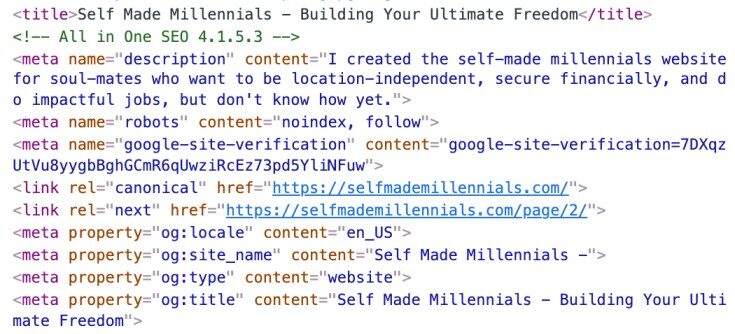


And here



Any ideas about what might be wrong?
P.S. I intentionally made some changes to my website code for educational purposes. The following are examples of what you should NOT do if you want to grow a healthy website over time.
You should have noticed the following tiny detail on the first screenshot: <meta name=”robots” content=”noindex, follow”>
This one-line piece of code tells Google not to index this particular page.
You might have a fascinating website, but Google won’t show it in search, and people won’t find it. That’s a severe issue SEO managers should be able to discover and fix!
The following rules in the robots.txt file tell Google to disallow the crawling of the entire website! No epic SEO results are possible if your website is excluded from indexing.
User-agent: *
Disallow: /
I’ve shown the two examples above for a reason! Besides content optimization, every SEO professional should possess technical SEO skills to keep websites “healthy.”
What are the top skills used in technical SEO? I would highlight the following — HTML and CSS.
As an SEO specialist, you will closely collaborate with developers and recommend what to update or change to improve the website’s performance. You should possess technical SEO skills and read HTML code to do so.
You won’t need to code websites but you must understand the code. Based on my experience, the following are a few issues that an SEO professional faces daily where SEO technical skills are required:
- Poor website loading speed
- Poor indexability
- Absence of sitemaps
- 404 pages and broken links
- Pages redirects
- Issues with duplicate content and lack of meta tags.
If you are determined to improve your technical SEO skills, I recommend you start with the following:
7. Ability to use SEO tools
Using various SEO tools, automating routine processes, and making data-driven decisions are essential SEO specialist skills.
I’ve changed several marketing jobs, all requiring Ahrefs and Semrush experience. These are two world-known toolkits marketers use for SEO, PPC (paid advertisement), link building analysis, competitor and keyword research, and much more.
Your value as a specialist grows on the market if you possess SEO expert skills and leverage various marketing tools.
For example, I use Ahrefs for keyword research, SEO audit, and SEO writing. I learned how to use it by trial and error at my former workplaces.
It’s a paid tool, but you can practice keyword research using affordable alternatives, like “People Also Ask” Google box, Mangools, Frase.io, SEOTesting.com, and ContentKing, to name a few.
There are so many SEO tools that it’s easy to get confused about what to use and when. I advise you to try several marketing tools, both free and paid.
In time, you’ll figure out what works best for you, and which tool saves your time and helps you achieve impactful results. Learn from trial and error. It’s the best strategy based on my experience. If you win, you win, but if you fail, you always learn!
8. Knowledge of Google tools
Every website owner uses (or should use, if not yet) Google Analytics and Google Search Console.
Google Analytics can help you understand your most popular website pages, users’ demographic and behavioral data, best-selling pages, exit pages, and more! It is a powerful tool to analyze your website’s current state and define opportunities for improvement.
Google Search Console helps you track your website’s indexability, performance in search, and technical errors, such as a 404 page.
These are free tools developed by Google to help website owners and webmasters grow their websites. When combined together, these tools provide insightful data you can’t find elsewhere!
Knowledge of Google tools is a basic SEO skill every marketer should possess to qualify as a professional.
You only need one source to master Google Analytics from zero. The good news is, it’s free!
Google Analytics Academy is the best free resource that teaches you everything you need to know to become skilled in GA. You will be qualified to take the test and get certified upon passing all the courses.
9. Ability to use WordPress content management system
Over 64 million active websites used content management systems in 2021, according to First Site Guide.
Why are content management systems so popular? They let you create and publish new pages in a few minutes without coding.
It’s super convenient for bloggers, startups, and small businesses that don’t have enough resources yet but want to establish their online presence.
Moreover, I run and monetize my website using WordPress — the most popular CMS. I use Cloudways as a hosting provider.
WordPress takes over 43.41% of the total CMS market share, leaving Wix, Joomla, Drupal, Squarespace, and other content management systems behind, according to First Suite Guide.
Like other website owners, I publish my content via WordPress, use different plugins to optimize WordPress performance and reduce the website’s loading speed.
Since I know WordPress and SEO, I can easily set up a simple WordPress website and publish optimized content. However, many companies and solopreneurs need WordPress specialists with experienced SEO skills.
Since WordPress powers most corporate and private blogs, you should get familiar with the WordPress interface, Yoast SEO plugin, content editor, and other features.
“Experienced WordPress user” is a valuable skill for SEO jobs employers look for that can become your competitive advantage and land you the job of your dreams.
10. Understanding online business strategy
Marketing is an essential part of any business strategy, along with sales, finance, and product development.
SEO, on the other hand, is part of marketing. Together with social media, paid advertisement, and content marketing, it helps businesses achieve their core objectives.
As an SEO expert, you will have various tasks that will always be in line with the business goals, like making X number of sales per month or increasing the traffic by X%.
A basic understanding of online business processes gives you a better idea of what your employer might expect from you as an SEO expert.
For instance, if you do SEO for an online store, you might need to increase the website traffic to help a company make more sales.
When I joined the marketing department during my internship, I could hear all the business discussions daily and get a holistic overview of how the business worked.
This way, I could better understand how my job tasks are aligned with the core business objectives. It motivates you to work harder and helps you see the positive impact of your work.
You can only prove your expertise and SEO skills if your work has a positive impact.
Therefore, take some time to learn the basics of online business strategy and marketing strategy. I share some introductory courses on Coursera which can help you do so:
How to put SEO skills on a resume
“How to list SEO skills on a resume?” “How to advertise my SEO skills?” — the following are popular questions SEO specialists ask when looking for new jobs.
After three years of marketing work, I wondered how to present my expertise and skills to stand out among job seekers.
I realized the competition for top marketing positions is high. A simple list of “here is what I did” won’t help to land a dream job. You need to highlight more achievements and the impact of work to hook employers.
Here is how I describe my SEO skills and marketing skills on LinkedIn:
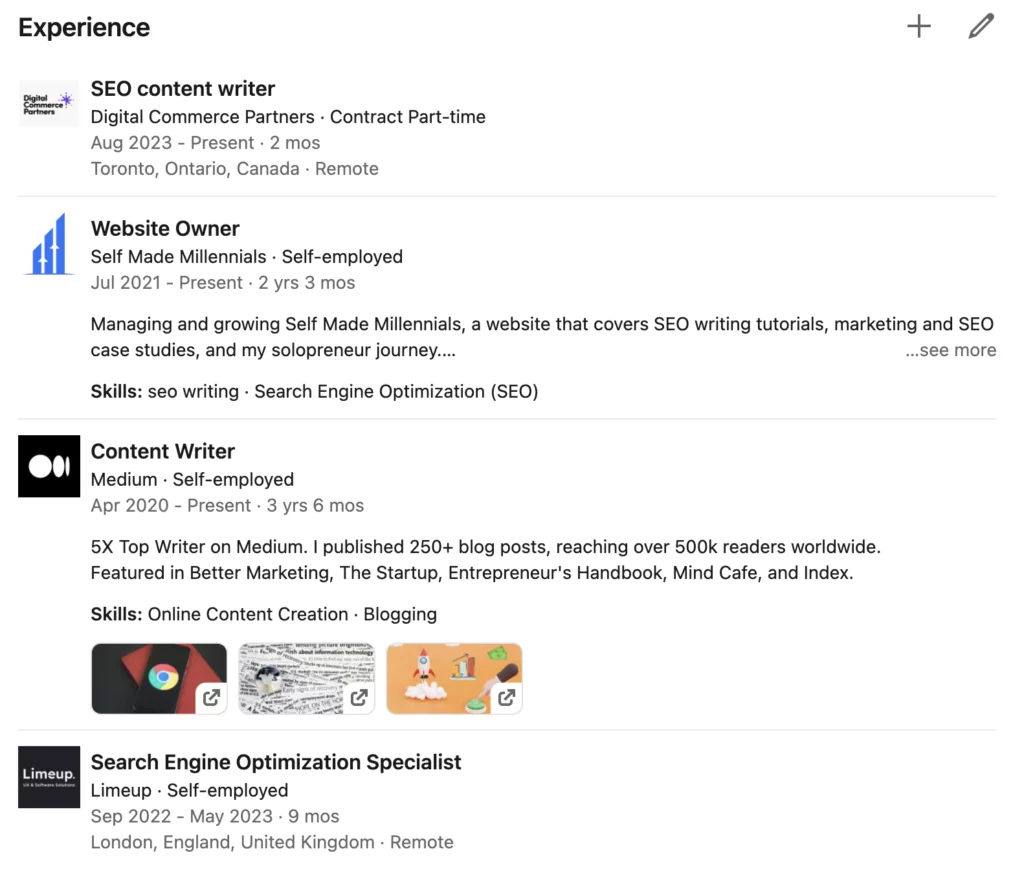


First, I listed my former workplaces chronologically and the tools I worked with. Besides, I added the links to the content I created.
This way, potential employers can assess my blogging and SEO writing skills. However, that’s not all!
In the cover letter, I explained that my transactional blog posts rank in the top 10 Google search results and generate leads.
I also mentioned that my Medium content reached over 600,000 readers worldwide. Inspired by my humble Medium success, I launched my website, ranking on the 2nd and 3rd Google search results a few months after release.
Why did my job application stand out? I have a few assumptions on this matter:
- I showed “what I achieved,” instead of “what I did.”
- I showed tangible examples of my work, such as published articles and optimized blog posts.
- Not every SEO expert runs a blog. It was my competitive advantage.
I have also accompanied my CV with a short bio section focused on my main professional achievements:
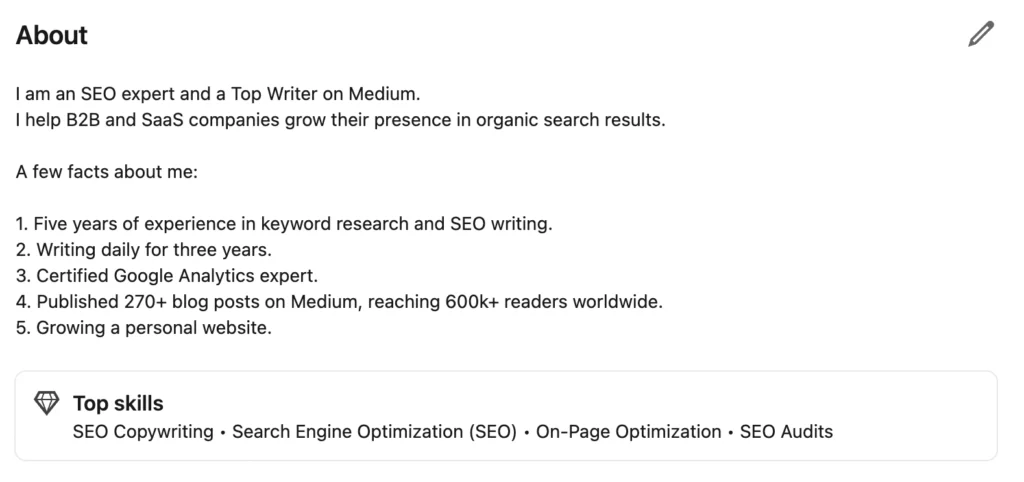


If you wonder how to sell your SEO skills, create a compelling CV first! Focus on the impact of work. No one is interested in what you did if you can’t talk about your results and achievements.
How to prove SEO skills in a job interview
Get ready for tricky questions if you are interviewed for a middle or senior SEO specialist position.
Based on my experience, the interview part lasts up to 1.5 hours. You will be asked to summarize your experience, highlight the most notable projects, list failures and explain your motives for changing a job. Better prepare the answers in advance!
Next comes the question & answer part to check your skills for an SEO job.
I had the following questions during my interview that I did not find online during my preparation:
- How to prove the value of SEO for stakeholders?
- Imagine we have a page ranking in the first position on Google. How many clients can we expect to get from it?
- What is the latest Google algorithm update?
- How would you explain SEO to a five-year kid?
- What would you do on the first day at work as an SEO expert?
An interview should be a friendly discussion with a positive vibe. Don’t try to come up with the answers if you don’t know something. Instead, you can share your thoughts and how you would approach problem-solving.
During the interviews, I referred to facts from research studies and the latest industry trends, which helped impress my interlocutors.
SEO is a big industry where changes happen daily!
If you want to develop website SEO skills and succeed as a specialist, follow the latest trends, and research studies, experiment a lot, and be bold to share your achievements regardless of the outcome!
What jobs you can do with SEO skills
If you spent some time developing skills for SEO, now it’s time for action! You can kick off your career in SEO in one of the following positions:
- Junior SEO specialist
- SEO content writer
- Technical SEO specialist
- Link builder
- Researcher
- On-page SEO specialist
- Expert with local SEO skills
My humble advice is to get an entry-level marketing job regardless of the industry.
You will learn and practice much as a junior marketer within 1 to 2 years. This will give you the mindset and skills to prepare for an SEO career.
SEO career opens up many opportunities and grants you “freedom” to some extent.
Freedom to work on projects you want, anywhere, and whenever you want. If you nail SEO, you won’t be dependent on employers.
Instead, new, exciting opportunities will find you on your own. All you’ll have to do is catch yours!
Need help writing optimized content for your website?
As an SEO writer, I can help you with keyword research, on-page optimization, and technical SEO.
I can write about general and niche topics, such as user experience design, search engine optimization, and web development, to name a few.
Learn more about my SEO blog post writing services.



Hello there!
My name is Victoria.
I am an SEO expert, Medium top writer, solopreneur, and the founder of Self Made Millennials. I help companies create optimized content and attract potential customers through organic search results. In addition, I share how content creators can monetize their writing skills.
Download my case study
Latest posts
Grab my SEO writing guide
Related blog posts
SEO writing 21 SEO Content Writing Services For 2024 written by Victoria Kurichenkoposted on February 1, 2023As a marketer and SEO expert, I often rely on various SEO content writing services when I work on my own and clients’ projects. In particular, professional SEO content writing services help with niche …
SEO writing SEO For a New Website In 2023 written by Victoria Kurichenko updated on October 16, 2022 A well-performing website is often perceived as a lucrative but challenging endeavor. It seems everything has already been said and written online, and there is no way to get noticed in all …


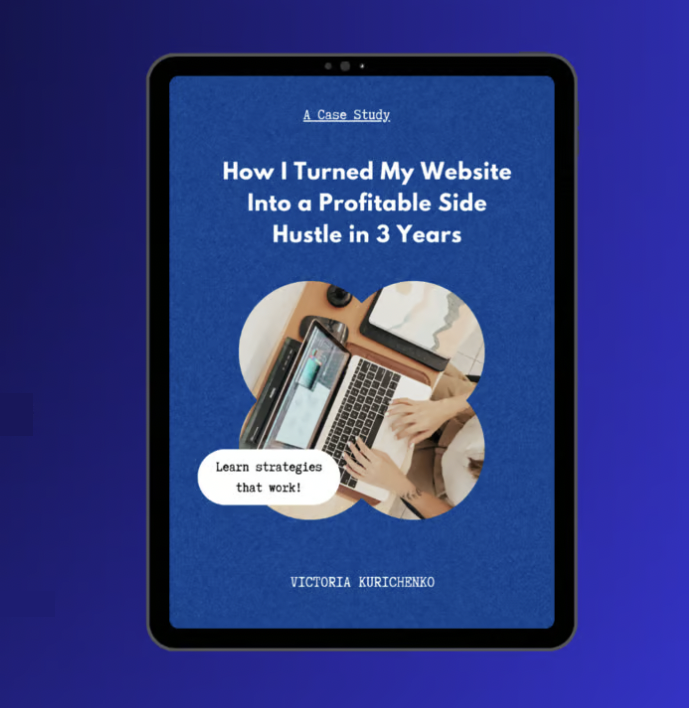
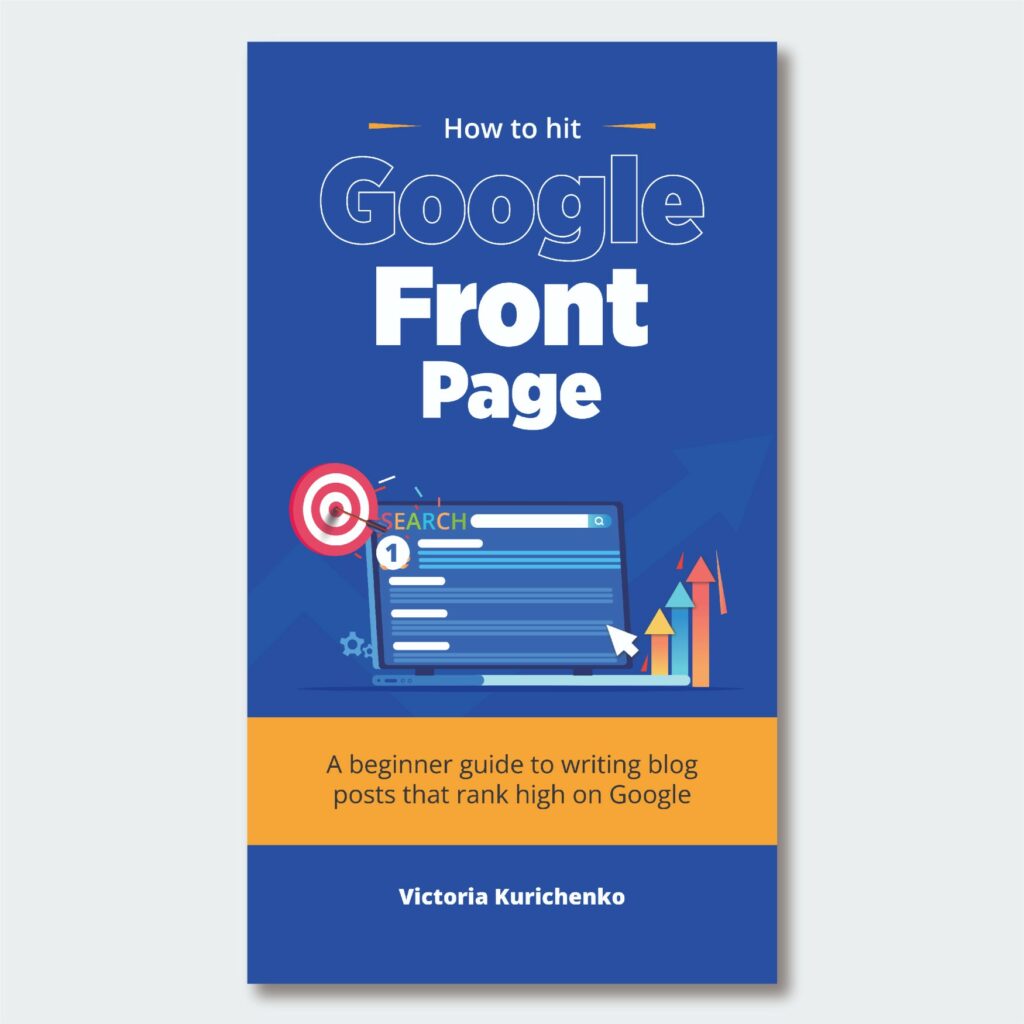


39 Responses
Great blog! I found the information to be both informative and well-presented. Bravo.
Normally I do not examine put up on weblogs, but I would want to say that this write-up very forced me to try to do it! Your composing style is shocked me. Many thanks, very pleasant write-up.
I am actually delighted to glance at this weblog posts which carries a ton of valuable specifics, many thanks for providing such data.
Fantastic website! Do you’ve got any solutions for aspiring writers? I’m planning to start off my very own Site before long but I’m somewhat misplaced on all the things. Would you suggest starting up which has a free platform like WordPress or Opt for a compensated possibility? There are many options available that I’m completely confused .. Any solutions? Thanks a whole lot!
The top site and amazing posts! Just keep the work on!
I like the efforts you have put in this, regards for all the great content.
Thank you!
Pretty! This has been a really wonderful post. Many thanks for providing these details.
Thank you, Cierra!
I appreciate you sharing this blog post. Thanks Again. Cool.
You’re so awesome! I don’t believe I have read a single thing like that before. So great to find someone with some original thoughts on this topic. Really.. thank you for starting this up. This website is something that is needed on the internet, someone with a little originality!
I like the efforts you have put in this, regards for all the great content.
I truly appreciate your technique of writing a blog. I added it to my bookmark site list and will
Pretty! This has been a really wonderful post. Many thanks for providing these details.
I just like the helpful information you provide in your articles
Very well presented. Every quote was awesome and thanks for sharing the content. Keep sharing and keep motivating others.
This is really interesting, You’re a very skilled blogger. I’ve joined your feed and look forward to seeking more of your magnificent post. Also, I’ve shared your site in my social networks!
Thank you so much Murat!
Pretty! This has been a really wonderful post. Many thanks for providing these details.
Thank you, Elijah!
Very well presented. Every quote was awesome and thanks for sharing the content. Keep sharing and keep motivating others.
Thank you, Katie! I appreciate your comment.
I’m into blogging and I really appreciate your content. The article has actually peaks my interest. I’m going to bookmark your website and maintain checking for brand spanking new information.
Thank you, Clara!
Have you tried using AI to speed up your writing process?
Not yet. Would you recommend it?
I am truly thankful to the owner of this website who has shared this fantastic piece of writing at this place.
You are welcome, Coby!
Thank you for reading.
Very well presented. Every quote was awesome and thanks for sharing the content. Keep sharing and keep motivating others.
Thank you! 🙂
I’m often to blogging and I really appreciate your content. The article has actually peaks my interest. I’m going to bookmark your web site and maintain checking for brand spanking new information.
Hi Arthur,
Thank you so much for your reading my articles and for your feedback!
Content quality is my priority. 🙂
Greetings from Idaho! I’m bored to death at work so I decided to check out your site on my iphone during lunch break. I enjoy the information you present here and can’t wait to take a look when I get home. I’m surprised at how fast your blog loaded on my cell phone. I’m not even using WIFI, just 3G .. Anyhow, superb site!
Thank you so much for reading my article. I appreciate your comment! Indeed, I’ve worked on my website loading speed optimization for a while.
Wow, that’s what I was exploring for, what a information! existing here at this weblog, thanks
admin of this website.
You made a number of fine points there. I did a search on the subject and found nearly all persons will agree with your blog.
Dear Amira,
Thank you so much for reading my article and I am happy you liked it.
Great content! Keep up the good work!
Thank you so much! I am trying my best to create helpful and easy-to-understand content!